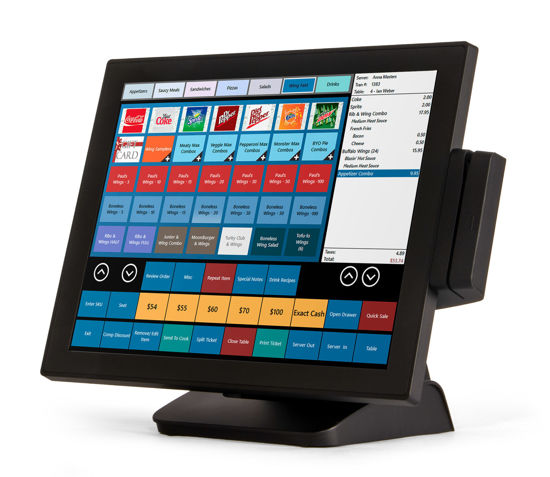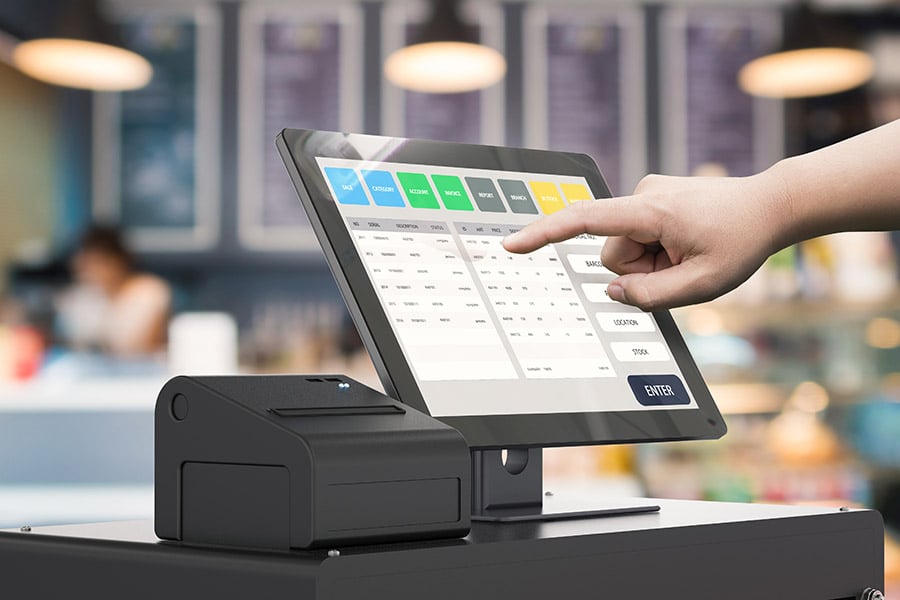All About Pos Software
All About Pos Software
Blog Article
The 25-Second Trick For Restaurant Pos

Point of Sale Software: Retail Point-Of-Sale Solutions Streamline Transactions
Our Pos System For Small Business Diaries

Hardware Parts of a Point of Sale System What makes a POS system tick? It's not simply software; the hardware plays a starring function. Think of it as the body to the software's brain. Without the best hardware, even the most advanced POS software application is just a quite face. Essential POS Hardware So, what are the must-haves? Let's simplify. The central processing unit, typically a computer or tablet, is website the heart of the operation. The screen or touchscreen display permits personnel to interact with the system. A barcode scanner speeds up the checkout process. Remember the days of manually getting in each code? The reliable receipt printer provides customers with a record of their purchase. A cash drawer keeps your cash safe and organized. A card reader allows consumers to pay with credit or debit cards. Diving Deeper: Beyond the Essential However wait, there's more! Depending upon your service, you might require specialized hardware. A dining establishment may integrate kitchen area printers to relay orders, while a retail shop might use label printers for item tagging. Ever wonder how your regional bakeshop immediately prints those delicious-looking labels? Selecting the Right Hardware: A Balancing Act Choosing the best hardware isn't practically purchasing the most pricey equipment. It has to do with finding the sweet area between functionality, toughness, and budget plan. A small company just beginning may choose a more fundamental setup, while a high-volume seller will need robust, high-performance machines. Is it much better to purchase new or used? Consider your alternatives thoroughly. A brand-new system offers the current technology and service warranty security, but a refurbished system can save you cash. The Future of POS Hardware What does the future hold? Anticipate to see even more integration with mobile gadgets, biometric scanners for worker authentication, and advanced analytics control panels showed on bigger, clearer screens. Envision a world where inventory is immediately updated in real-time as products are scanned-- a world where you can track your best-selling item from throughout the world. The possibilities are unlimited, and the hardware is continuously evolving to fulfill the needs these days's businesses. Are you ready to update your point of sale system?
Software Application Features and Capabilities: The Heart of Your POS System
Ever watch an experienced barista glide through a hectic morning rush? Their secret isn't simply caffeine; it's a smooth dance with their POS system. The software application is the conductor of your organization symphony, orchestrating whatever from sales to inventory. What notes should you be listening for? What capabilities truly matter in today's market?
Stock Management: Beyond Counting Beans
Forget spreadsheets that haunt your dreams. Modern POS systems offer real-time inventory tracking, signaling you when your stock of artisanal coffee beans dips precariously low. Think of it as a digital guardian angel, avoiding those uncomfortable "Sorry, we're out!" minutes to clients. What if you could likewise anticipate demand based upon historic information? Many systems now use forecasting tools, a powerful weapon versus overstocking and lost sales. This helps prevent the circumstance of lacking popular items or collecting excess stock of slow-moving products, both of which can constrain cash flow and space.
Sales Reporting and Analytics: Decoding the Data
Sales data is the new gold, and your POS system is the miner. Forget just knowing just how much you offered today. Dive deep into the information to discover patterns, recognize your best-selling products, and understand consumer behavior. Which menu product sets completely with the everyday special? Which promo resonated most with your clientele? These insights are not just fascinating; they're actionable intelligence. Without trusted sales reporting, browsing the intricacies of service decision-making becomes like cruising without a compass, increasing the possibility of errors and missed out on chances.
Customer Relationship Management (CRM): Building Bridges, Not Walls
Remembering a regular customer's name and favorite order is captivating, however scaling that individual touch is difficult. POS systems with CRM capabilities enable you to track customer purchase history, preferences, and even birthdays. Imagine immediately using a discount rate on their birthday-- a small gesture that cultivates commitment and motivates repeat company. However there is the potential snag of poor information quality, which can result in incorrect client profiles and ineffective marketing efforts.
Payment Processing: Enhancing the Deal
The checkout experience can make or break a sale. Smooth combination with various payment techniques-- credit cards, mobile wallets, even copyright-- is non-negotiable. Can your system manage split payments? Does it use secure tokenization to protect client information? A clunky payment process is like hitting a sour note in your service symphony, potentially interfering with the whole efficiency. Making sure compatibility with evolving payment innovations and adherence to security standards are vital for keeping customer trust and operational efficiency.
Worker Management: Keeping the Team in Sync
From clocking in and out to handling consents and tracking efficiency, employee management includes enhance operations and improve accountability. Is scheduling a headache? Lots of POS systems offer incorporated scheduling tools, enhancing staffing levels based upon predicted demand. A typical challenge that is typically overlooked is the obstacle of incorporating staff member management performances with payroll systems, which can lead to errors and inefficiencies in wage estimations.
Advanced Characteristics: Leveling Up Your Operations
- Table Management: Suitable for dining establishments, this feature enables you to envision your dining-room, track table status, and manage appointments.
- Loyalty Programs: Reward your best clients and encourage repeat organization with incorporated loyalty programs.
- Online Ordering Combination: Effortlessly integrate your POS system with online purchasing platforms to broaden your reach.
Choosing the ideal POS system has to do with more than just functionality; it's about discovering a partner that can grow with your organization. Consider your present requirements, expect future development, and don't hesitate to ask the hard concerns. The best software can transform your company from a chaotic cacophony into an unified masterpiece.
Industry-Specific POS System Applications
Believe of the regional pastry shop, bustling with early morning customers craving fresh croissants. A generic POS system might manage transactions, however can it handle intricate recipes, track component stock, or automatically change production schedules based upon sales information? Most likely not. That is where the appeal of industry-specific POS systems shines.
Dining establishments and Hospitality
For busy restaurants, speed and precision are paramount. The number of times have you seen servers juggling orders, adjustments, and splitting expenses, all while attempting to offer excellent service? A restaurant POS system simplifies these procedures, allowing for table management, cooking area order tickets, and even online ordering combination. These systems frequently consist of features like ingredient-level inventory tracking, crucial for managing food costs and minimizing waste. Ever wonder why your favorite meal is in some cases not available? It may stem from an absence of proper inventory management.
- Table Management
- Kitchen Order Tickets
- Online Buying Integration
- Ingredient-Level Stock Tracking
Retail Solutions
Retail, with its varied stock and client interactions, demands a various set of tools. Think of a store clothes store struggling to monitor sizes, colors, and seasonal collections utilizing a basic checkout system. An industry-specific retail POS system provides functions like barcode scanning, customer loyalty programs, and in-depth sales reporting. These systems can even integrate with e-commerce platforms, providing a seamless omnichannel experience for consumers. Did you understand some retail POS systems can anticipate future sales trends based on historic data? Now that is effective!
The Dangers of a Mismatch
Choosing the incorrect POS system can develop considerable functional hurdles. A clothes boutique utilizing a restaurant POS, for example, would discover it unsuitable for handling inventory with sizes and colors. The absence of proper reporting and analytics might lead to misinformed buying decisions and lost earnings. The outcome might be similar to trying to fit a square peg in a round hole.
Secret Factors to consider
Picking an industry-specific POS system requires careful examination. Think of your organization's unique needs and functional workflows. Does the system integrate with existing software application? Does it use the required reporting capabilities? Is it scalable to accommodate future growth? A well-chosen POS system is not just a deal tool; it's a strategic property that can drive effectiveness, enhance client fulfillment, and eventually, enhance your bottom line. Keep in mind, it is an investment in your organization's future, not simply an expenditure.
Security Considerations for Point of Sale Systems
Ever heard the tale of the mom-and-pop shop that lost everything since of a single, overlooked security flaw in their POS system!.?. !? It's a cautionary tale, and it highlights an important aspect typically eclipsed by the allure of fancy features and structured operations. The reality is, a POS system is just as excellent as its security. What good is a system that crunches numbers in a flash if it enables bad guys to swipe consumer's information simply as rapidly?
The Vulnerability Minefield
The digital landscape is a battlefield. Every POS system, no matter size or sophistication, is a potential target. Are you truly got ready for the risks lurking around the corner? The genuine pinch comes when you find that your out-of-date software has an open hole that hackers can make use of, turning your company into an unwitting accomplice in identity theft. The trouble is that hackers are crafty and are constantly altering their strategies.
Common Security Gaps and Specialist Tips
- Weak Passwords: "Password123" isn't cutting it. Usage strong, special passwords for all POS system accounts and change them routinely. Two-factor authentication is a must.
- Unsecured Networks: Your Wi-Fi resembles leaving the front door open. Secure your network with strong encryption (WPA3 if possible) and think about a separate network for your POS system.
- Out-of-date Software: Software application suppliers spot security holes all the time. Failing to update is like inviting trouble. Establish automatic updates or schedule routine maintenance.
- Worker Training: Your personnel is your very first line of defense. Train them to recognize phishing attempts, safeguard passwords, and report suspicious activity.
Information File Encryption: Your Shield Versus the Dark Arts
Believe of information encryption as a secret code. It scrambles delicate information, like charge card numbers, making it unreadable to unapproved users. Without encryption, your clients' financial information are like sitting ducks, ripe for the selecting by cybercriminals. It's not simply about protecting your customers; it's about safeguarding your reputation and preventing hefty fines.
PCI Compliance: The Rulebook You Can't Overlook
If you accept credit cards, you're bound by the Payment Card Market Data Security Standard (PCI DSS) It's a set of security standards developed to safeguard cardholder data. Failing to comply can lead to fines, charges, and even the loss of your capability to process charge card payments. It's a headache, yes, however it's a necessary one. Think about PCI compliance as the expense of doing business in the digital age.
Consider this: every transaction processed through your point of sale is a possible entry point for malicious stars. By carrying out robust security procedures, you're not just safeguarding your organization; you're protecting your clients' trust and guaranteeing the long-term viability of your operations. The security of your POS system isn't just a technical problem; it's a service imperative. It needs consistent watchfulness, proactive steps, and a dedication to remaining ahead of the curve.